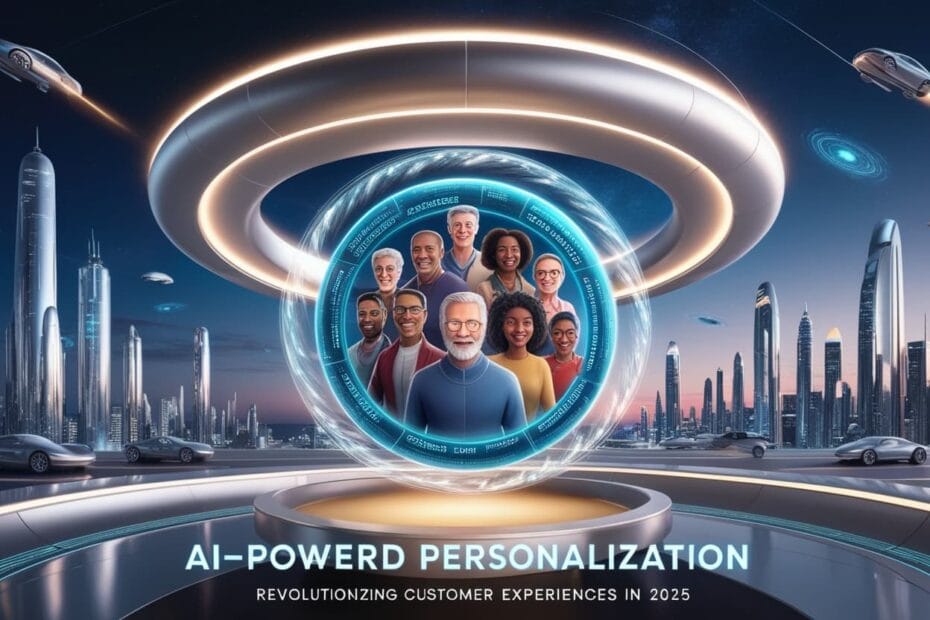In the digital marketing realm, 2025 has emerged as a pivotal year for the integration of artificial intelligence (AI) into customer experience strategies. AI-powered personalization is no longer a futuristic concept; it is the cornerstone of modern marketing. Businesses are harnessing the power of AI to deliver tailored experiences that not only meet but exceed customer expectations, revolutionizing how brands interact with their audiences.
The Rise of AI in Personalization
AI’s role in personalization has evolved rapidly, driven by advancements in machine learning, data analytics, and natural language processing (NLP). With the ability to process vast amounts of data in real time, AI enables businesses to understand customer preferences, behaviors, and needs at an unprecedented level.
Key Drivers of AI Adoption in Personalization
- Big Data Explosion: The exponential growth of data from social media, e-commerce, and IoT devices has created a treasure trove of insights that AI can analyze.
- Consumer Demand for Personalization: Customers increasingly expect brands to offer relevant and meaningful interactions tailored to their preferences.
- Technological Advancements: Breakthroughs in AI technologies, such as GPT models, recommendation engines, and sentiment analysis tools, have made personalization more accessible and effective.
How AI-Powered Personalization Works
AI-powered personalization leverages algorithms and data analytics to deliver customized content, products, and services to individual users. Here’s a breakdown of the process:
1. Data Collection and Integration
AI collects data from multiple sources, including:
- Customer purchase history
- Website interactions
- Social media activity
- CRM systems
- Demographic information
2. Data Analysis and Segmentation
Machine learning algorithms analyze this data to identify patterns and segment customers into distinct groups based on:
- Behavior (e.g., frequent buyers, occasional browsers)
- Preferences (e.g., product categories, communication channels)
- Demographics (e.g., age, location, income)
3. Predictive Analytics
AI predicts future customer behavior using historical data and advanced analytics, enabling businesses to anticipate needs and preferences.
4. Content and Product Recommendations
Recommendation engines powered by AI suggest products, services, or content that align with individual customer interests. For instance:
- E-commerce: Suggesting products based on browsing history
- Streaming Platforms: Recommending movies or music based on past consumption
5. Real-Time Personalization
AI delivers personalized experiences in real-time, adapting to customer behavior as it happens. For example:
- Dynamic website content based on visitor’s location or preferences
- Personalized email marketing campaigns with tailored subject lines and offers
Applications of AI-Powered Personalization
AI-driven personalization is transforming various industries. Here are some notable applications:
1. E-commerce
- Dynamic Pricing: AI adjusts prices based on demand, competitor pricing, and customer behavior.
- Product Recommendations: Platforms like Amazon use AI to suggest products that match customer preferences.
- Personalized Discounts: AI identifies customers likely to respond to specific discounts or promotions.
2. Entertainment
- Content Curation: Streaming services like Netflix and Spotify use AI to recommend movies, shows, and playlists.
- Interactive Experiences: AI-driven virtual assistants enhance user engagement through personalized interactions.
3. Healthcare
- Personalized Health Plans: AI tailors fitness, diet, and wellness recommendations based on individual health data.
- Patient Engagement: Chatbots provide personalized health advice and appointment reminders.
4. Travel and Hospitality
- Customized Itineraries: AI suggests travel plans based on customer preferences and past bookings.
- Smart Recommendations: Hotel and airline platforms use AI to offer tailored promotions and upgrades.
5. Education
- Adaptive Learning: AI-powered platforms create personalized learning paths for students.
- Content Recommendations: Educational apps suggest resources based on user’s learning goals.
Benefits of AI-Powered Personalization
The advantages of leveraging AI for personalization are transformative:
1. Enhanced Customer Experience
AI creates seamless and intuitive customer journeys by delivering relevant and meaningful interactions.
2. Increased Engagement and Retention
Personalized content fosters deeper connections with customers, increasing loyalty and retention rates.
3. Improved ROI
Targeted marketing efforts powered by AI result in higher conversion rates and better ROI.
4. Scalability
AI enables businesses to deliver personalization at scale, catering to millions of customers simultaneously.
5. Data-Driven Decision Making
AI provides actionable insights that help businesses refine their strategies and offerings.
Challenges in AI-Powered Personalization
While the potential is immense, there are challenges to consider:
1. Data Privacy Concerns
The collection and use of personal data raise ethical and legal questions, necessitating robust data protection measures.
2. Implementation Costs
Integrating AI technologies can be expensive, particularly for small and medium-sized businesses.
3. Dependence on Data Quality
AI’s effectiveness depends on the quality and accuracy of the data it analyzes.
4. Avoiding Over-Personalization
Excessive personalization can feel intrusive and may alienate customers if not executed thoughtfully.
Future Trends in AI-Powered Personalization
As AI technologies continue to evolve, several trends are shaping the future of personalization:
1. Hyper-Personalization
Going beyond basic personalization, hyper-personalization involves real-time data to create even more targeted experiences.
2. Voice and Visual Search
AI-powered voice and visual search tools are enhancing how customers discover products and services.
3. AI-Generated Content
AI tools like ChatGPT are enabling businesses to create personalized content at scale.
4. Multichannel Integration
Seamless personalization across multiple touchpoints, including websites, apps, and offline channels, will become standard.
5. Ethical AI Practices
Transparency and fairness in AI algorithms will be a key focus, ensuring customer trust.
Case Studies: Success Stories in AI-Powered Personalization
1. Amazon
Amazon’s recommendation engine generates 35% of its revenue by suggesting products tailored to individual preferences.
2. Netflix
Netflix’s AI algorithms personalize recommendations, keeping users engaged and reducing churn rates.
3. Sephora
Sephora uses AI-powered tools to offer personalized beauty recommendations, enhancing the shopping experience.
4. Starbucks
Starbucks’ AI-driven app personalizes menu recommendations based on user preferences and purchase history.
AI-powered professionalization is revolutionizing customer experiences in 2025, driving engagement, loyalty, and business growth. By leveraging advanced technologies, businesses can anticipate and meet customer needs with precision, delivering experiences that feel personal and impact. While challenges remain, the future of AI-driven personalization is bright, promising a world where brands and customers connect on a deeper, more meaningful level.

